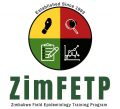Background
Up until 1992, Zimbabwe faced an acute need for post-graduate level public health training. Most public health posts were filled temporarily by expatriate doctors, mainly Dutch public health specialists under a government to government agreement. In addition, Zimbabwean physicians who did serve in public health posts but went overseas for public health training, frequently found themselves ill-equipped to function in local public health settings on return . In response to these training needs, the Ministry of Health and Child Care (MOHCC) in partnership with the University of Zimbabwe (UZ), Department of Community Medicine (DCM) and with funding from the Rockefeller Foundation (www.rockfound.org) started a Master of Public Health (MPH) program using the Public Health Schools Without Walls (PHSWOW) strategy.
The first PHSWOW in Africa was founded in Zimbabwe in 1993 with four trainees. The goal of the MPH project was to produce highly competent multi-disciplinary public health professionals who would assume influential posts in the country’s public health structures and tackle emerging and re-emerging communicable and non-communicable diseases.
Currently the combination of an economic recession, drought, and an HIV epidemic has worsened the disease burden and worsened most public health indicators in Zimbabwe. The MPH program thus aims at assisting the MOHCC to create a permanent capacity to recruit, train, and employ public health practitioners to sustain the public health infrastructure. To accomplish this, an integrated programme of formal class work and a large element of supervised practice in actual public health settings was developed.

MISSION & VISION
To help the Zimbabwe Ministry of Health and Child Welfare create a permanent capacity to recruit, train, and use public health practitioners to sustain the public health infrastructure and improve delivery of services at national, provincial, district, and municipal health authority level.
Partners





